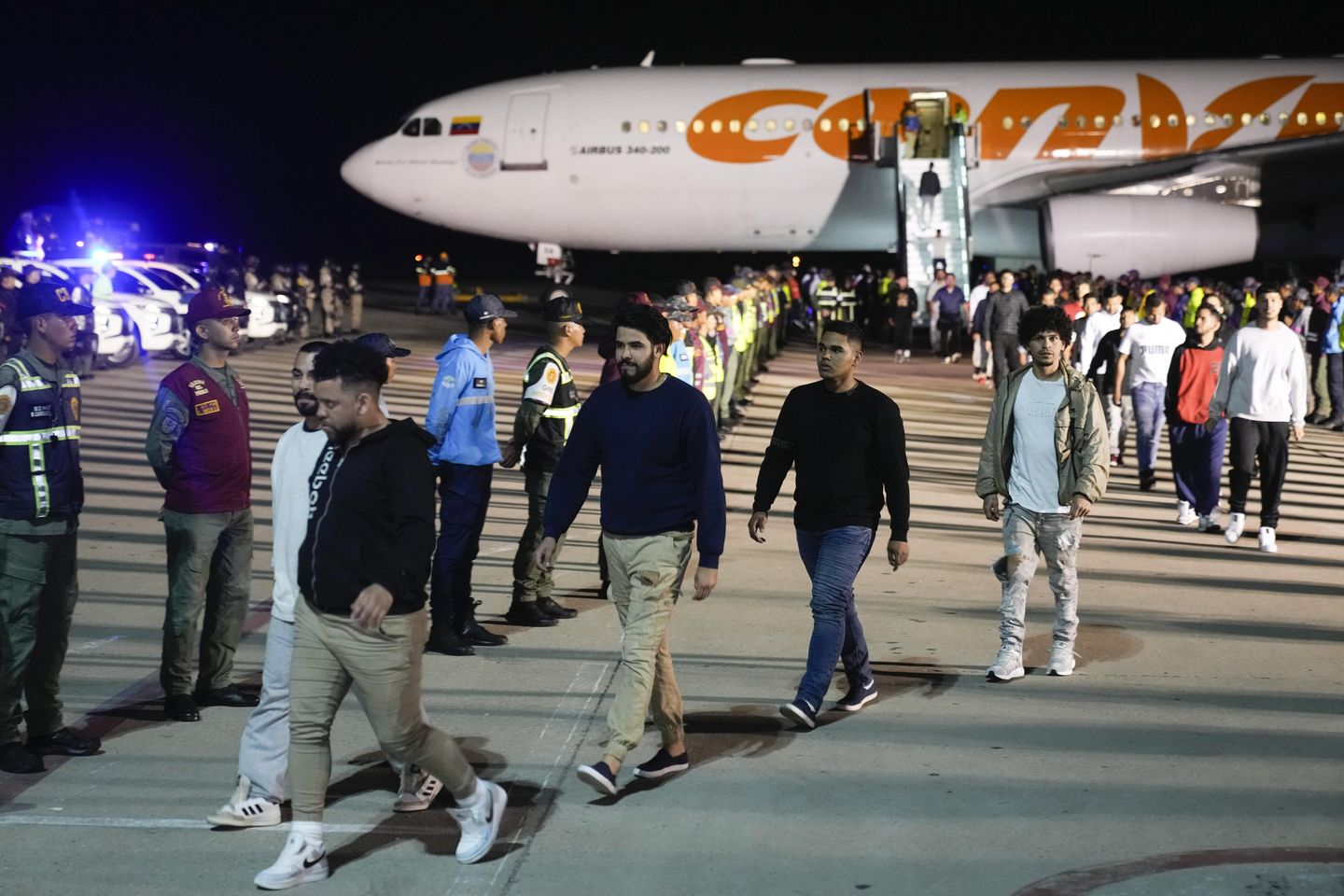
A federal appellate judge slammed the Trump administration on Monday for treating Venezuelan gang deportees worse than Nazis as her court grappled with President Trump’s expansive claims of immigration and national security powers.
Judge Patricia Millett grilled the Justice Department over its handling of more than 200 deportations so far, and an unknown number of others who are on Homeland Security’s target list now that Mr. Trump has invoked the Alien Enemies Act.
“Nazis got better treatment under the Alien Enemies Act than has happened here,” said Judge Millett, an Obama appointee.
The Justice Department’s lawyer bristled at that comparison and defended Mr. Trump’s use of the law, saying the president is acting under core national security powers to deal with members of Tren de Aragua, the notorious gang that infiltrated the U.S. during the Biden years.
Mr. Trump is using the Alien Enemies Act, a 1798 law, to short-circuit usually lengthy deportation cases and kick out TdA gang suspects. Immigration rights groups say he’s trampling on their rights and didn’t even give more than 200 people sent to a Salvadoran terrorist prison a chance to prove they aren’t gang members.
The case has moved quickly, blossoming into a major constitutional showdown between Mr. Trump and Judge James Boasberg, who issued a temporary restraining order blocking further ousters — and hinting at forcing the government to bring back previously deported gang members.
On Monday morning Judge Boasberg, an Obama appointee, narrowed the legal basis for his ruling, dropping broader questions about Mr. Trump’s powers and ruling the chief problem is that Venezuelans aren’t able to challenge their deportations before they happen.
He dismissed Trump arguments that the detained gang members pose a danger to Americans.
“The noncitizens comprising the class are already in United States custody, and any actual Tren de Aragua member is already subject to deportation as a member of [a foreign terrorist organization], so there is little additional harm to the public by temporarily preventing their removal,” Judge Boasberg wrote.
He said he’s not ordering anybody be released from custody, but does want to given them a chance to argue against their deportations.
The case is now before the Circuit Court of Appeals for the District of Columbia, and about the only thing all sides agreed on was that Mr. Trump and the courts are breaking new legal ground.
“We are in unprecedented territory,” Judge Millett said.
Justice Department lawyer Drew Ensign said Judge Boasberg has botched the case from the start, issuing competing rulings that make it tough to pin down the issues.
But he said Mr. Trump’s team has argued major national security and foreign policy issues are at stake, and the courts need to back off.
“The intrusion upon the war powers and foreign policy power of the president is utterly unprecedented,” Mr. Ensign argued.
Judge Millett pounded Mr. Ensign with questions for roughly an hour.
She said the previous times the Alien Enemies Act has been used to oust people, such as after World War II, the U.S. was in a declared war. Even then, there were review boards that were tasked with determining whether targets were actual Nazis.
She said no such opportunity has been given to the Venezuelans.
“I mean, you all could have picked me up on Saturday and thrown me on a plane,” she said.
Judge Justin Walker, though, was more sympathetic to the government’s case. He peppered the American Civil Liberties Union’s lawyer with questions about why they brought their case in Washington rather than in Texas, where the five original plaintiffs are being detained.
He suggested deportation targets do have a process for challenging their removal through what’s known as habeas claims. Those are powerful but very narrow challenges to government detention.
Judge Walker, a Trump appointee, said he couldn’t think of any case where a district judge interfered with an “overseas national security operation” and had that ruling stand on appeal.
Lee Gelernt, the American Civil Liberties Union lawyer, said people are being “disappeared.”
“We’re looking at people now who may be in a Salvadoran prison for the rest of their lives,” he said.
He said they are gathering evidence that many of the people already shipped out weren’t connected to the gang. Some have even argued they were victims of the gang.
He urged the appeals court to leave the lower court ruling in place, heaping praise on Judge Boasberg for moving carefully on a tricky case.
But Mr. Ensign asked for speed from the judges, saying Mr. Trump’s powers are being eroded by Judge Boasberg.
Mr. Trump has declared TdA connected to the Venezuelan government and a foreign terrorist organization. He has also declared that it is engaged in an “invasion” or “incursion” into the U.S., which triggers the Alien Enemies Act.
Mr. Ensign said those sorts of decisions are left to Congress and the president, and judges can’t question them.
In addition to Judges Millett and Walker, Judge Karen Henderson, appointed by George H.W. Bush, is also on the case. The judges did not indicate when they will issue a ruling.






![Trump's Admin Guts Another ‘Rogue Government Agency with Zero Accountability’ [WATCH]](https://www.right2024.com/wp-content/uploads/2025/03/Trumps-Admin-Guts-Another-‘Rogue-Government-Agency-with-Zero-Accountability-350x250.jpg)
![‘We All Owe Him (Elon) a Huge Debt of Gratitude’ [WATCH]](https://www.right2024.com/wp-content/uploads/2025/03/‘We-All-Owe-Him-Elon-a-Huge-Debt-of-Gratitude-350x250.jpg)









